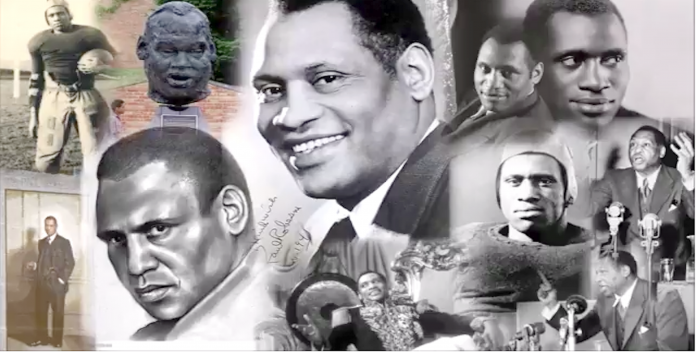Paul Robeson was born on April 9, 1898. He was the youngest of five children. His father was born a slave on a North Carolina plantation. Following years of suffering the inhumanity and depravity of slavery, he risked his life to escape to the North. He was only 15 years old.
Free and ambitious, Robeson’s father began the task of pursuing an education. He attended Lincoln University, studying Theology. He met and married Maria Louisa Bustill while at Lincoln. Once he graduated, he became pastor of the Witherspoon Baptist Church in Princeton, New Jersey. Rev. Robeson became a father for the first time when he was 53 years old when Paul was born.
Paul’s mother died tragically when he was only 16, and Paul became closer to his father. He enjoyed his father’s sermons and sang in the choir. He especially enjoyed the Negro Spirituals. While in high school, he sang in the Glee Club. Not only did he sing, but he was also a versatile athlete playing football, baseball, basketball, and running track. Despite participating in all these activities, he graduated with honors, receiving a four-year scholarship to Rutgers College, now Rutgers University.
In college, Paul was not allowed to sing in the Glee Club because there were parties after the programs that no Blacks could attend. He tried out for football; however, the other team members attempted to exclude him from the team. Determined, he persevered and was twice named to the All-American Football Team. Paul’s father died when he was a junior in college.
He received the Phi Beta Kappa key in his junior year, belonged to the Cap & Skull Honor Society, and graduated as Valedictorian.
After graduation, Robeson moved to New York to attend Columbia University Law School. To earn extra money, he played professional football for the Milwaukee Badgers.
At Columbia Law School, Robeson met and married Eslanda Cordoza Goode, who was to become the first Black woman to head a pathology laboratory. He secured a position with the law firm; however, he left the practice of law due to the racism he encountered there.
Instead, he used his artistic talents in theater and music to promote African and African American history and culture.
With his magnificent baritone voice, Robeson was soon a well-sought-after performer in the U.S. Before long, he won international acclaim for his performances, touring around the world to sold-out audiences. Yet he was more than just an actor. His was a voice for International Peace and Justice and he was a champion of working people and organized labor, denouncing racism and all forms of discrimination worldwide. He made speeches about his concerns following concerts. He marched in front of theaters that made Blacks sit in the back seats, he marched in front of offices of baseball teams that would not hire Blacks, and he challenged President Truman to support anti-lynching laws.
As a result of his outspokenness, in the 1940s, his concerts were canceled, and in 1949, two interracial outdoor concerts in New York were attacked by racist mobs while police stood by. In 1950, his U.S. passport was revoked, denying his right to travel and earn income abroad, which led to an eight-year battle, and in 1956, the House Un-American Committee accused Robeson of being a communist.
Robeson retired from public life in 1963, following his last concerts in New Zealand and Australia in 1960.
Robeson relocated to Philadelphia in 1966 following the death of his wife. He died on January 23, 1976, at the age of 77.
The house on Walnut Street, where he resided with his sister Marian, is now the home of The Paul Robeson House and Museum. Here the life and legacy of Paul Robeson are celebrated and preserved. This year marks the 125th Celebration of the Life and Legacy of Paul Robeson. For a full schedule of events, visit the Robeson House website: paulrobesonhouse.org. Vignettes on Robeson’s life can also be found on the website.
“Robeson… lives, overwhelmingly, in the hearts and minds of the people whom he touched, the people for whom he was an example, the people who gained from him the power to perceive and the courage to resist. It is not a sentimental question. He lived in our times; we live in his… It is a matter of bearing witness to that force which moved among us.” James Baldwin


